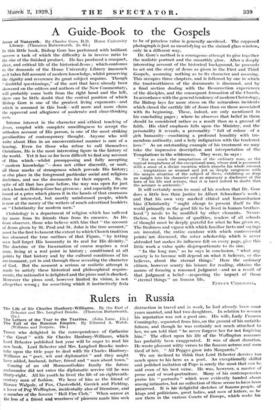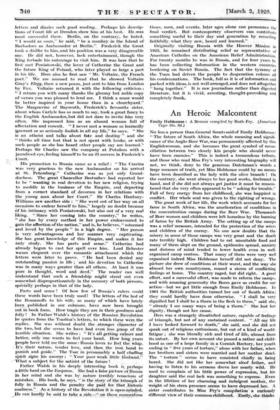Rulers in Russia
TuOSE who delighted in the correspondence of Catherine " the Great " with Sir Charles Hanbury-Williams, which Lord Ilehester published last year will be eager to read his new book, Lord Ilehester -arid Mrs. Langford. Brooke • under- take upon the title page to deal with --Sir Charles Rinbury- Williams as " poet, wit and dipleiriatist " and they might have added, husband, father, friend and " man about town."
Coming of an old Monmouthshire family the future ambassador did not enter the diplorhatie service till he was thirty-eight. All his youth he lived the life of an eighteenth- century man of fashion. We hear of him as the friend of Horace Walpole, of Fox, Chesterfield, Garrick and Fielding, a lover of-Pei Woffingtoni incidentally also‘ of literature; arid a member of the famous " Hell Fire Club." When sorrow at the loss of a friend and wearinesi-of -pleasure made him seek distraction in travel and in work, he had already been some years married, and had two daughters. In relation to women his reputation was not a good one. His wife, Lady Frances Conningsby, separated from him, on the ground of his unfaith- fulness, and though he was certainly not much attached to her, we are told that " he never forgave her for not forgiving him." The effect upon his life of the Woffington romance has probably been exaggerated. It was of short duration. He wrote pleasant-witty verses to the famous actress and soon tired' of hir; " All Peggys- grow into Margarets."
We are inclined to think that Lord Ikhester devotes too much space to his hero as a poet. An exceptionally skilful and polished imitation of§ Pope is surely the most that can be said even of his bat wise. He was, however, a master of prose and of word-portraiture. Many of his contemporaries praise his " portraits " which were evidently handed about among intimates, but no collection of them seems to have been preserved.. It- is his -delightful. sketches of famous people, of kings and politicians, great ladies, and men of letters, as he saw them in the various Courts of Europe, which make his letters and diaries such good reading... Perhaps Ills descrip- tions of Court life at Dresden, show him at his best: He ,was most successful there. Berlin, on the contrary, he hated. " I would as soon," he said, " be a monkey in the Island of Barbadoes as Ambassador at Berlin.", Frederick the Great took a dislike to him, and his position was a very disagreeable one. He did not, however, lack entertainment, though the King forbade his entourage to visit him. It was here that he first met Poniatowski, the lover of Catherine the Great and . the future King of Poland, who later played so large a part in his life. Here also he first saw " Mr. Voltaire, the French poet." We are amused to read that he showed Voltaire Gray's Elegy, then a new poem, just sent to him from London by Fox. Voltaire returned it with the following criticism : " I return you with many thanks the gloomy but noble copy of verses you was pleased to lend me. I think a muse would be better inspired in your house than in a churchyard." The Margravine of Bayreuth, Frederick's favourite sister, about whom Carlyle has so much to say, took a great fancy to the English Ambassador, but did not dare to invite him very often. She impressed him as an absurd woman full of affectation and conceit. " I never met a woman so learnedly ignorant or so seriously foolish in all my life," he says. " She is an atheist and talks about fate and destiny " and she " thinks all time lost that is not spent with books, or with such people as she has heard other people say are learned." Perhaps Sir Charles saw the company at Potsdam with a jaundiced eye, feeling himself to be an ill success in Frederick's court.
His promotion to Russia came as a relief : " The Czarina was very gracious to the new Ambassador on his arrival at St. Petersburg." Catherine was as yet only Grand- duchess. The great Chancellor Bestuzhev had reported her to be " wanting in real devotion to her new religion, trying to meddle in the business of the Empire, and departing from a correct standard of decorum in her relations with the young men, about her Court." Sir Charles Hanbury- Williams saw another side " She went out of her way on all occasions to endear herself to him," largely no doubt because Of his intimacy with Poniatowski, but also out of a very real liking. " Since her coining into the country," he writes, " she has by every method in her power endeavoured to gain the affection of the nation," and is, he believes, " esteemed and loved by the people_" in a high degree. " Her person is very advantageous and her manner very captivating. She has great knowledge of this Empire, and makes it her
• only study. She has parts and sense." Catherine had already begun to cast her spell over him. Lord Ilchester waxes eloquent over the romantic attachment which the letters were later to prove. " He had been denied any outstanding passion in life ; • and his devotion to Catherine was in many ways greater than all others. At least it was ure in thought, word and deed." The readei can well erstand that such a friendship might stand out even somewhat disproportionately in the memory of both Persons, specially perhaps in that of the lady.
Parts and sense ! Of how few of Russia's rulers could these words have been truly used ! The letters of the last of the Romanoffs to his wife, so many of which have lately been published in our columns, have now been brought out in book form. How tragic they, are in their goodness and folly ! In Father Walsh's history of the Russian: Revolution he quotes from the Tsaritsa's letters, to which these were the replies. She was without doubt the: stronger, character of the two, but she seems to have had even less grasp of the terrible situation. She writes : " It's all getting calmer and better, only one wants to feel your hand. How long. years people have told finethe same : Russia loves to feel the whip. - It's their nature, tender love, and then the iron hand to punish and guide." The Tsar in presumably a half chaffing spirit signs his answer : "-Your poor weak little husband." - 'What a subject for the satirist of the future !
Father Walsh in his deeply interesting book is perhaps a little hard on the Empress:. She had a false picture of Russia in her mind and she was . by nature terribly tenacious of mistakes. . His book, he says, " is the story of the triumph of folly in Russia and the penalty she paid. for that _historic madness." As a history of the Revolution it is open-minded. He can hardly be said to take a side: 7" on these momentous
times, men, and events. later ages alone can pronounce the final verdict. But contemporary observers can contribute something useful to their day and generation by recording faithfully, what they saw, heard and learned."
Originally visiting- Russia with the Hoover Mission in 1923, he remained distributing relief as representative of American Catholics on the American Relief Administration. For twenty months he was in Russia, and for four years he has been collecting information in the western countries bordering on Soviet Russia. The fact that the tyranny of the Tsars had driven the people to desperation colours all his condemnations. The book, full as it is of information and packed with ideas, is not well arranged, and does not altogether " hang together." It is raw journalism rather than digested literature, but it is vivid, arresting, thought-provoking and completely frank.

























































 Previous page
Previous page